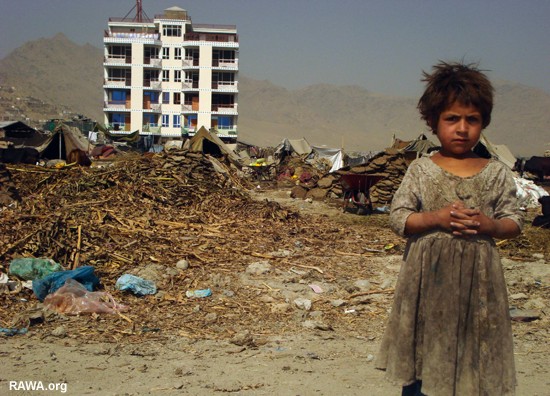Katherine O'Neill
Only when Shala lifts up her shapeless, lavender-coloured burka, can you tell that the 32-year-old Afghan woman is with child.

About 1,600 Afghan women die in childbirth out of every 100,000 live births. In some of the most remote areas, the death rate is as high as 6,500-Reuters (April 30, 2008)
Almost four months pregnant, the mother of three has made the dangerous journey to Kandahar city from her home in rural Panjwai district to get an ultrasound.
Shala and her husband travelled part of the 50-kilometre distance by donkey and avoided all major roads for fear of hitting a homemade bomb. They also left at night and wore old clothes to avoid attracting attention from Taliban insurgents warring with Canadian soldiers.
Since the repressive Taliban regime was toppled in late 2001, Afghanistan, which has one of the highest infant and maternal mortality rates in the world, has vastly improved health-care services for mothers and their babies.
However, in restive regions in southern Afghanistan, such as rural areas in Kandahar and Helmand provinces, many women say the situation has worsened.
"During the Taliban, there was no problem for us. We had a doctor near our village. Now it's not safe for them. They went away," said Shala, who like many Afghans does not have a last name.
Her past four pregnancies were all difficult - one was a miscarriage - and she must make the trip to Kandahar city once a month for checkups.
Shala said her husband, whom she refuses to name for fear he will be targeted by militants, can afford the trips because he owns a small poultry business.
She said many of her female neighbours are poor and often have to borrow money from other women to head to the city for doctor's appointments and the delivery.
There are some who go through their entire pregnancy without ever setting foot in a hospital or clinic, she added. Untrained midwives often assist with home births - and complications, such as bleeding and hypertension, can be fatal for both the mother and baby. About 24,000 women die every year in Afghanistan after childbirth.
Abdul Qayum Pakhla, director of health for Kandahar province, said the lack of security in certain rural areas is a continuing concern. In recent years, several medical workers in these regions have either gone missing or been killed by insurgents.
There are currently four Kandahar districts that have no clinics because of the lack of security. However, Dr. Pakhla said that since the Taliban regime was removed, overall health-care services in the province have improved significantly.
He said Kandahar city, where pregnant women have access to free deliveries and medicines, has become a health-care hub for the province.
The Canadian government has spent at least $350,000 supporting maternal health programs run by the Afghan government and United Nations Children's Fund.
Some of the money is going toward building a residential obstetric-care facility in Kandahar city. It will open later this summer.
It is expected that more than 1,000 patients a year will use the facility as they wait to give birth in the nearby government hospital.
Last year, a preliminary report by Johns Hopkins University in Baltimore found that the number of children who die before their first birthdays in Afghanistan dropped 18 per cent to 135 per 1,000 live births in 2006 from 165 per 1,000 in 2001. In Canada, the rate in 2005 was 5.4 per 1,000.
Afghan government officials praised the research as a real sign of recovery for the war-ravaged country, and an indicator that access to health-care services for women and children had improved dramatically since 2001, especially in rural areas.
However, data from four provinces, including Kandahar, were left out of the countrywide study because of the lack of security in those turbulent areas.
The Afghan government has committed itself to reducing maternal mortality by 20 per cent by 2020 and officials have increased programs to train midwives and facilitate access to female medical staff. But the lack of security in certain areas remains a barrier.
Bibi Rayalia, who also lives in the Panjwai district, southwest of Kandahar, hopes that security will improve enough in the coming years so that when her four daughters become mothers they won't have to risk their own lives just to go to the doctor.
Like Shala, the 41-year-old mother of six also had to make the dangerous trip into the city recently for a checkup. She is four months pregnant.
She said there is only one clinic close to her home (Panjwai district used to have four), but it's always crowded and doesn't have medical staff to deal with complicated pregnancies.
Shala and Rayalia are illiterate and uneducated about birth control, as are most women living in rural Afghanistan.
Shala said she wants to stop having children, but she is too embarrassed to ask her doctor for advice about contraception. "I don't want any more babies, but I don't know how to do it."



